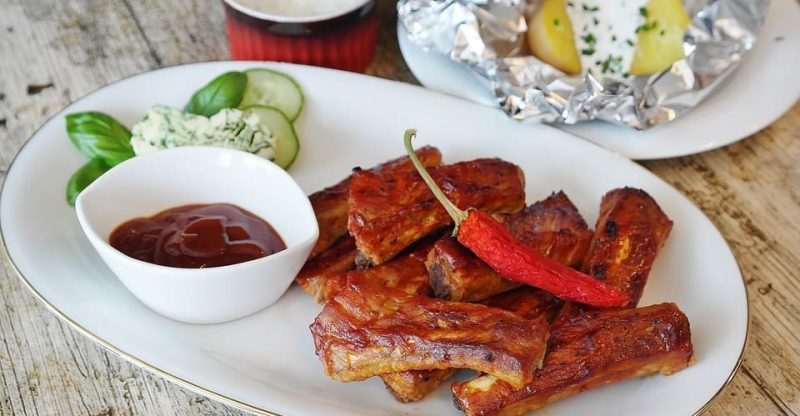What Is Disodium Inosinate (E631) In Food: Uses, Safety, Side Effects

Production | Uses | Safety | Side Effects | FAQs
Disodium inosinate (IMP), a kind of nucleotide, also known as disodium 5′-inosinate, is a flavor enhancer with the European food additive number E631. Its purpose in food is to add a meaty or savory flavor, which is called umami taste. IMP is a white granular or powder commonly combined with another flavour enhancer disodium guanylate (GMP) as disodium 5′-ribonucleotides (E635) or with monosodium glutamate (MSG).
How is it made?
It is the disodium salt of inosinic acid that can be produced by two methods: through sugar fermentation OR comes from yeast extract. And the following are the two manufacturing processes.
In the sugar fermentation process, bacterial fermentate carbon source or sugar to get inosine. (1)
Then inosine reacts with phosphoryl chloride to get inosinic acid, finally neutralize to obtain disodium inosinate (2).
Here is the reaction equation: 
Also, IMP can be made by the degradation of nucleotides into nucleic acid from yeast extract. (3)
Properties
| Other names | IMP, Disodium 5′-inosinate, Disodium inosine-5′-monophosphate, 5′-inosinic acid, disodium salt |
| CAS number | 4691-65-0 |
| Chemical formula | C10H11N4Na2O8P |
| Molecular weight | 392.17(anhydrous) |
| Solubility | Soluble in water, 13g/100ml, 20 degree; sparingly soluble in ethanol, practically insoluble in ether. |
| Stability | It is stable at 100 °C and will not decompose until the temperature is around 230 °C. |
Structure

From Wikipedia
What are the uses?
Disodium 5′-inosinate is a flavor enhancer that can be used in many processed foods. Its flavor enhancing power is around 50% of disodium guanylate. Commonly used together with MSG or disodium guanylate in seasoning, condiments and salt substitutes for soups, sauces and snack foods but seldom used alone in food.
With MSG
It is commonly in synergy with monosodium glutamate (MSG) to provide umami taste. For example, it has a significant flavor synergy with MSG at the ratio of 1:7.
With disodium 5’-guanylate
Disodium 5 ribonucleotides is also a taste flavor, known as I+G, a mixture of disodium inosinate and disodium guanylate (E627) at the ratio 1:1. It can be used in MSG-free foods to replace MSG. The strength of flavor-enhancing of the combination of 98% MSG with 2% I+G is around four times that of monosodium glutamate (MSG) alone when. (4)
Is disodium inosinate Safe?
Yes, its safety when used as a food additive has been approved by the U.S. Food and Drug Administration (FDA), European Food Safety Authority (EFSA), Joint FAO/WHO Expert Committee on Food Additives (JECFA), as well as other authorities.
FDA
FDA claimed it may be safely used in food as a flavoring adjuvant for human consumption. (5)
EFSA
Disodium inosinate (E631) is listed in Commission Regulation (EU) No 231/2012 as an authorised food additive and categorized as “additives other than colours and sweeteners” (6)
Safety assessment
EFSA has not previously assessed it as additives to feed or food and the safety cannot be assessed due to not enough information on the production process when in the evaluation in 2014 (7).
It is in the list of remaining food additives to be re-evaluated for the usage level and/or concentration data in food and beverages intended for human consumption, according to Regulation (EU) No 257/2010 (8). However, there is no updated information so far.
UK Food Standards Agency
Categorized in “Others” (9)
Food Standards Australia New Zealand
In Australia and New Zealand with the code number 631. (10)
JECFA
Functional class: Food additives: flavor enhancer. (11)
Acceptable daily intake: ADI “not specific” was set in 1993. (12)
What are the Possible Side Effects?
It is common that sometimes consumers have health concerns if disodium inosinate is bad for our health and what are the dangers. It is generally considered safe and has no side effects.
The toxicity study in early years established on rats, rabbits, monkeys, chickens, dogs, and also in humans showed that disodium inosinate did not have significant toxicity, no observed carcinogenicity, genotoxicity, or adverse effects on reproduction. (13)
Pregnant And Breastfeeding
It is generally safe but better consult your doctor.
Frequently asked questions
Is IMP Natural?
Yes, it is natural instead of an artificial flavor. It is widely present in nature as the building blocks of DNA and RNA, such as in meat and seafoods.
Is IMP Vegan?
Yes, as mentioned above, it is vegan as the raw material inosine or inosinic acid and manufacturing process without the use of animal matter or products derived from animal origin. As a food ingredient, it is considered vegan and vegetarians can eat it.
Is IMP Halal?
Yes, it is generally recognised as halal as it is permitted under the Islamic Law and fulfill the conditions of Halal. And we can find some manufacturers certificated with MUI halal.
Is IMP Kosher?
Yes, it is kosher pareve. E631 has met all the “kashruth” requirements and can be certified as kosher.
Is IMP Gluten free?
Yes, it is gluten free or without gluten as comply with the FDA’s definition of gluten free, that it does not contain wheat, rye, barley, or crossbreeds of these grains.
Conclusion
Now you may have a good knowledge of the flavour enhancer – disodium inosinate (E631), from its production, uses, approved safety, possible side effects and some FAQs such as is it vegan, gluten free, synthetic or natural.
What kinds of food packaging have you found this ingredient in? Let me know in the comments.



Have found food additives 631 and 627 used as flavour enhancers in Tom Piper brand Braised Steak And onion. A tinned product retailed in Australia.
It is listed ingredients in Knorr Chinese Chicken Soup made in Pakistan. I am bit concerned about the ingredients added as food additives from South Asia and South East Asia bcz of the nature of people from there due to their Non Safety concern and highly corruption which reflects in food and other things. So now I can safely eat that soup bcz of your very well presented facts. Thank you
You’re welcome
I have found this ingredient in Ocean Cafe frozen crab cakes manufactured by Tampa Bay Fisheries in Dover Fl. Along with Sodium tripolyphosphate and Tetrasodium Pyrophosphate. I will not buy this product again as I refuse to feed those I love unnatural chemicals.
Found in Lipton, recipe secrets, onion recipe soup and dip mix . It does bother me that 1 tablespoon has 610 mg of sodium
Doritos contain MSG AND IMP AND GMP. I noticed them in the list of ingredients after watching a few videos
put out by some pro-natural food commentator on Youtube. I don’t have much opinion pro or con, but it MIGHT
be a bit of overkill to put quite so much flavor enhancer in any product (as tasty as Doritos undoubtedly ARE) LoL
Yeast extract is a booming multi billion dollar industry. People who are allergic or have an upper GI intolerance for Mushrooms should avoid Yeast extract and products that contain yeast. i found this out the hard way at 57 years old. Eliminating yeast and yeast extracts has almost completely eliminated my fatigue and arthritic symptoms
E631 and E627 in dried crispy Porphyra seaweed
I have found both in “Better than Bou
llion” stock mixes for soup.
I have found it in Pandaroo Japanese instant soup with fried tofu..will not be buying it again..It gave me severe sinus..
Knorr onnion soup
It is in most “Frenches” gravy mix